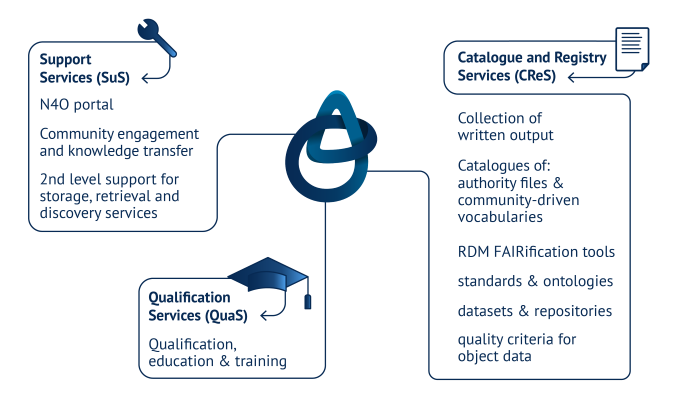What types of services do we offer?
In NFDI4Objects, a large number of services are being developed and refined.
These services follow the categorisation and definitions set out by the NFDI consortia congress in a white paper. The individual categories and what they mean are explained here.

Databases
Databases provide users with large amounts of structured data from repositories and archives. In most cases, the data can be uploaded, accessed, searched and/or downloaded via a web browser.
An example of a service in the Databases category in NFDI4Objects is ArboDat+.
Libraries/API
Program libraries are collections of software code that solve specific functions or tasks so that developers do not have to rewrite them each time. Application programming interfaces (APIs) enable communication between different software components, for example when a program retrieves data from an external database for the evaluation of find sites and integrates it into its own application.
Workflows/pipelines
This is software that combines several tools and applications into standardised workflows. They can be used locally or remotely via the internet.
An example of a service in the workflows category in NFDI4Objects is the workflow tool for archaeological experiments and analytics.
Tools and Applications
Tools and Applications refers to software for researchers for research data management that can be downloaded and run locally on the user’s hardware.
An example of a service in the Tools/Applications category in NFDI4Objects is Survey2GIS.
Support/Consulting
This category includes services that provide direct user support beyond assistance with specific individual services.
Our N4O helpdesk, for example, is one such service.
Data Curation
The curation category of services includes managing and promoting the use of data from the moment it is created. The aim is to ensure that it is meaningful for the current research question and can be found for later reuse. For dynamic data sets, this means continuous enrichment or updates. Curation also involves linking this data to other published materials (e.g., publications in scientific journals).
Training
Training includes materials for self-study as well as guided tutorials, workshops and other training events designed to educate users on the topic of research data management. Standalone training for self-study is usually available as a technical service (usually a web application). We focus primarily on providing training materials for the services developed and maintained within our consortium. However, our common understanding of training as a standalone service is not limited to the above and includes materials designed for training in all areas of research data management.
An example of a service in the training category in NFDI4Objects is the Commons Incubator.
Data storage
Data storage means services that provide storage space for the long-term archiving of research data for external users. Access is possible via web protocols.
An example of a service in the storage category in NFDI4Objects is the IANUS long-term archive and research data centre.